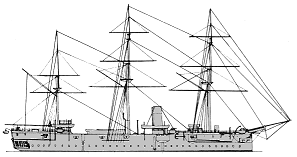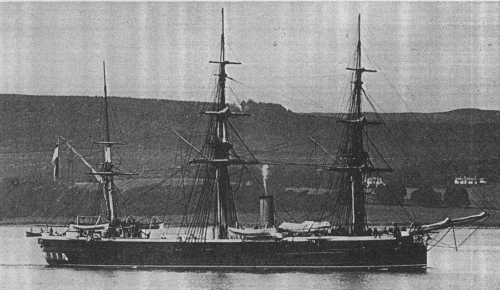

Shannon 1881
| Name | No | Yard No | Builder | Laid down | Launched | Comp | Fate |
| Shannon | Pembroke DYd | 29.8.1873 | 11.11.1875 | 19.7.1877 | coastguard 1883, sold 12.1899 |
|
Displacement normal, t |
5455 |
|
Displacement full, t |
|
|
Length, m |
79.3 pp |
|
Breadth, m |
16.5 |
|
Draught, m |
6.78 hold depth |
|
No of shafts |
1 (hoisting) |
|
Machinery |
sails + 1 4-cyl HC, 8 cylindrical boilers |
|
Power, h. p. |
3369 |
|
Max speed, kts |
12.3 |
|
Fuel, t |
coal 580 |
|
Endurance, nm(kts) |
2260(10) |
| Armour, mm | iron; belt: 229 - 152 on 330 - 254 teak backing, bulkheads: 229 - 203, decks: 76 - 38, CT: 229 |
|
Armament |
2 x 1 - 254/15 MLR Mk I/II, 7 x 1 - 229/14 MLR Mk IV, 6 x 1 -100/21 20pdr 16cwt BL |
|
Complement |
452 |
Project history: Britain's first armoured
cruiser and of somewhat obscure origin. She was intended for service on foreign
stations and it appears that she combined the requirements of a ship which was
both economical to build and operate with the need for an armoured vessel of
sufficient size to engage any ironclad likely to be encountered in distant
waters. The result was a ship too weakly armed and protected to be classed as a
battleship and too slow to adequately fulfil the war functions of a cruiser. She
would however have made a reasonable peacetime flagship in distant waters and
was suitable for 'showing the flag', but apart from a couple of months on the
China station and 2 years in the Pacific she spent most of her service in home
waters where her value was negligible.
All her guns were mounted on the upper deck with the heaviest, 2 254mm 18t MLRs,
mounted al the rear of the forecastle which was deeply embrasured to allow ahead
as well as broadside fire. The ports for these guns were cut in the angled
corners of a 229mm armour screen which extended across the full width of the
ship and for a short distance down each side. The remaining armament of 7 229mm
12t MLRs was unprotected; 3 were carried on each side and 1 aft, the latter with
alternate embrasured ports to port and starboard which allowed astern or
broadside fire.
For economy and because there were few facilities for coaling
in foreign stations, sailing qualities were regarded as paramount. Her design
therefore provided for a full ship rig, of 2200m² sail area, a lifting screw and
normal coal stowage of only 280t. Shortly after completion, in 1878, she was
changed to barque rig with 2000m² of sail and her foremast and bowsprit were cut
down slightly, while the coal capacity was doubled. Other modifications at this
time included the fitting of a 229mm armoured CT abaft the foremast, 6 20pdr BL
guns and Whitehead torpedo launchers, which resulted in the ship being
overweight with 0.3m more draught than designed. She proved poor under sail but
was a good seaboat, being steady and handy. Iron hull was sheathed with zinc.
Ship protection: The 2.7m deep waterline belt, positioned between the main and lower decks, was 229-203mm thick amidships and 152mm aft. The side armour terminated in a 229mm bulkhead about 21m short of the stem. This bulkhead was extended upwards by an 203mm bulkhead between the main and upper decks to join the armour screen of the two forward guns, thus forming a barrier against raking fire which extended from the lower deck to the forecastle. Forward of this bulkhead the lower deck was constructed of 76mm plating while the area above it, in the region of the waterline, was subdivided into coal bunkers, cofferdams and store rooms whose contents would serve to restrict the flooding resulting from damage on the waterline. This, the first use of a protective deck and watertight subdivision in place of full length side armour, was the most important feature of the design and one which was to be employed extensively in future vessels. The remaining protection consisted of a 38mm main deck over the area of the belt.
Modernizations: 1881: + some MGs, 4 - 356 TT
Naval service: She gad a very brief service life, being relegated in 1883 to coastguard duty.

Shannon after 1881 refit
© Navypedia, 2020